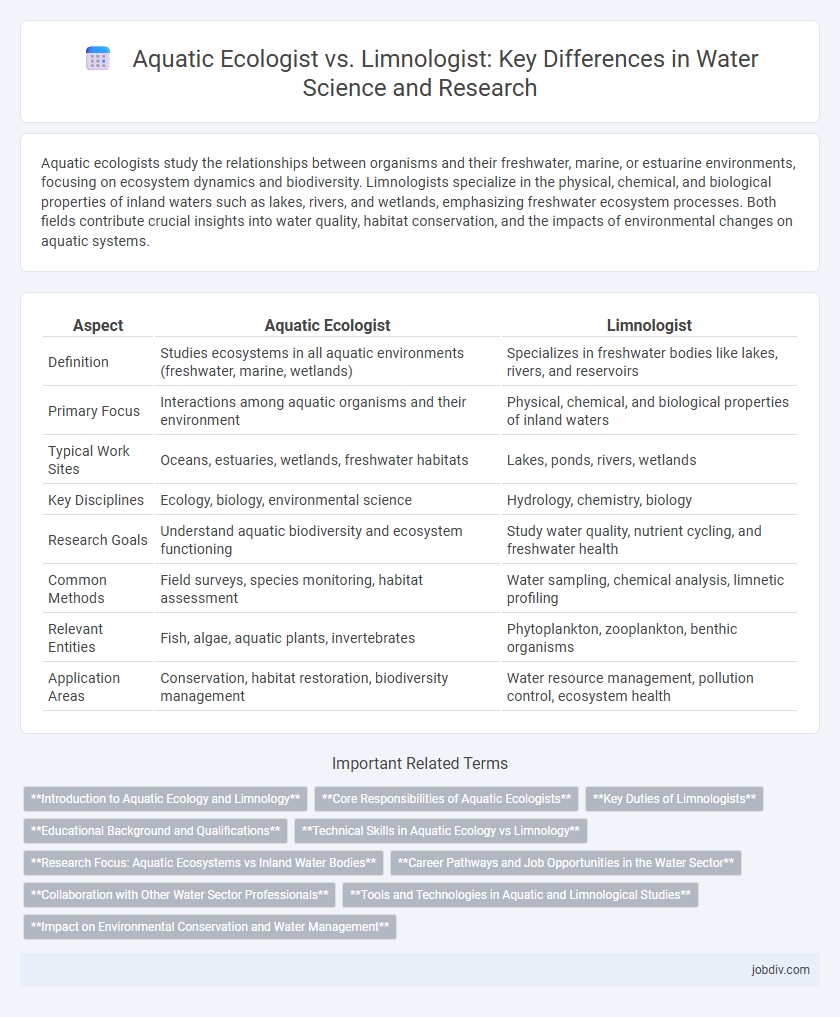Aquatic ecologists study the relationships between organisms and their freshwater, marine, or estuarine environments, focusing on ecosystem dynamics and biodiversity. Limnologists specialize in the physical, chemical, and biological properties of inland waters such as lakes, rivers, and wetlands, emphasizing freshwater ecosystem processes. Both fields contribute crucial insights into water quality, habitat conservation, and the impacts of environmental changes on aquatic systems.
Table of Comparison
| Aspect | Aquatic Ecologist | Limnologist |
|---|---|---|
| Definition | Studies ecosystems in all aquatic environments (freshwater, marine, wetlands) | Specializes in freshwater bodies like lakes, rivers, and reservoirs |
| Primary Focus | Interactions among aquatic organisms and their environment | Physical, chemical, and biological properties of inland waters |
| Typical Work Sites | Oceans, estuaries, wetlands, freshwater habitats | Lakes, ponds, rivers, wetlands |
| Key Disciplines | Ecology, biology, environmental science | Hydrology, chemistry, biology |
| Research Goals | Understand aquatic biodiversity and ecosystem functioning | Study water quality, nutrient cycling, and freshwater health |
| Common Methods | Field surveys, species monitoring, habitat assessment | Water sampling, chemical analysis, limnetic profiling |
| Relevant Entities | Fish, algae, aquatic plants, invertebrates | Phytoplankton, zooplankton, benthic organisms |
| Application Areas | Conservation, habitat restoration, biodiversity management | Water resource management, pollution control, ecosystem health |
Introduction to Aquatic Ecology and Limnology
Aquatic ecology examines the interactions of organisms within freshwater and marine environments, emphasizing ecosystem dynamics and biodiversity. Limnology specifically studies inland water bodies such as lakes, rivers, and wetlands, analyzing physical, chemical, and biological processes. Both disciplines contribute critical insights to water quality management, aquatic resource conservation, and understanding environmental changes in freshwater systems.
Core Responsibilities of Aquatic Ecologists
Aquatic ecologists primarily study the interactions between organisms and their freshwater, marine, or estuarine environments, focusing on ecosystem dynamics, habitat health, and biodiversity conservation. They analyze water quality, nutrient cycling, and the impacts of anthropogenic activities on aquatic communities to inform sustainable management practices. Their work often involves field surveys, data collection, and ecological modeling to support conservation efforts and policy development.
Key Duties of Limnologists
Limnologists specialize in studying inland freshwater ecosystems, focusing on the physical, chemical, and biological properties of lakes, rivers, and wetlands. Key duties include monitoring water quality, analyzing aquatic organisms' interactions, and assessing environmental impacts on freshwater habitats. Their research supports water resource management, pollution control, and ecosystem conservation efforts.
Educational Background and Qualifications
Aquatic ecologists typically hold degrees in ecology, environmental science, or biology, emphasizing ecosystem interactions and biodiversity in freshwater and marine environments. Limnologists often pursue specialized education in limnology or freshwater science, focusing on the physical, chemical, and biological properties of inland waters such as lakes and rivers. Both professions usually require advanced degrees (master's or PhD) and expertise in field research, data analysis, and environmental monitoring.
Technical Skills in Aquatic Ecology vs Limnology
Aquatic ecologists specialize in analyzing complex interactions within aquatic ecosystems using skills such as habitat assessment, biodiversity monitoring, and ecosystem modeling. Limnologists focus on technical expertise in studying freshwater bodies, employing advanced methods like water chemistry analysis, sediment sampling, and hydrodynamic modeling. Both fields require proficiency in laboratory techniques, data analysis software, and field instrumentation, with aquatic ecology emphasizing broader ecosystem dynamics and limnology concentrating on freshwater-specific physical and chemical processes.
Research Focus: Aquatic Ecosystems vs Inland Water Bodies
Aquatic ecologists study the interactions and biodiversity within a wide range of aquatic ecosystems, including marine and freshwater environments, emphasizing ecological processes and habitat dynamics. Limnologists specialize in the scientific study of inland water bodies such as lakes, rivers, and wetlands, focusing on physical, chemical, and biological properties specific to freshwater systems. Both fields aim to understand water environments but differ in the scope of their research, with aquatic ecology covering broader aquatic habitats and limnology concentrating exclusively on freshwater ecosystems.
Career Pathways and Job Opportunities in the Water Sector
Aquatic ecologists specialize in studying marine and freshwater ecosystems, focusing on biodiversity, habitat restoration, and environmental impact assessments, leading to career opportunities in conservation organizations, government agencies, and environmental consulting firms. Limnologists concentrate on freshwater systems such as lakes, rivers, and wetlands, often working in water resource management, pollution control, and research institutions addressing water quality and ecosystem health. Both fields offer roles in academia, environmental monitoring, and policy development, with increasing demand driven by climate change and sustainable water resource management initiatives.
Collaboration with Other Water Sector Professionals
Aquatic ecologists collaborate closely with limnologists to integrate biological, chemical, and physical data of freshwater ecosystems, enhancing water quality assessments and habitat restoration projects. Their joint efforts with hydrologists, environmental engineers, and water resource managers facilitate comprehensive management strategies for lakes, rivers, and wetlands. This interdisciplinary collaboration ensures effective monitoring of aquatic biodiversity and sustainable water resource utilization.
Tools and Technologies in Aquatic and Limnological Studies
Aquatic ecologists and limnologists utilize advanced tools such as remote sensing, GIS mapping, and water quality sensors to analyze freshwater ecosystems and aquatic biodiversity. Limnologists often focus on in situ measurements using multiparameter probes and sediment corers to study lakes and reservoirs, while aquatic ecologists integrate bioassessment protocols and telemetry for monitoring habitat dynamics and species interactions. Both fields employ molecular techniques like environmental DNA (eDNA) analysis to enhance species detection and ecosystem health assessments.
Impact on Environmental Conservation and Water Management
Aquatic ecologists study the relationships between aquatic organisms and their environments, providing critical data for biodiversity conservation and ecosystem health assessment. Limnologists specialize in freshwater systems, analyzing physical, chemical, and biological processes to inform sustainable water resource management. Both disciplines contribute to environmental conservation by guiding policies that protect water quality and promote resilience in aquatic habitats.
Aquatic Ecologist vs Limnologist Infographic

 jobdiv.com
jobdiv.com